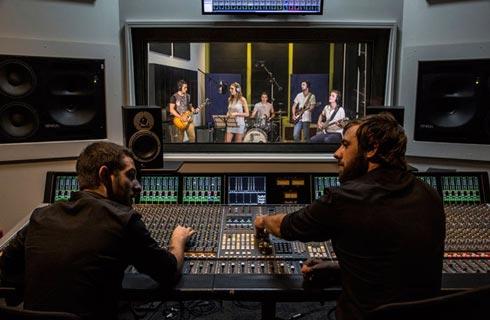人类学文学硕士-医学人类学
Master of Arts in Anthropology - Medical Anthropology

学历文凭
Masters Degree

专业院系
Department of Anthropology

开学时间

课程时长

课程学费

国际学生入学条件
Application is open to holders of a B.A., B.S., or higher degree in any field. We welcome applications from individuals pursuing particular interests and careers, especially those related to one of the department's areas of concentration.
An undergraduate record of good quality ( minimum 3.0 GPA or higher for all undergraduate studies)
One copy of transcripts from all undergraduate/graduate institutions attended are required.**
Prior training in anthropology (see below for details)
GRE scores are optional, not required. We will not penalize you if you don't take the GRE or submit GRE scores; we will evaluate your application on the basis of the evidence you submit. We understand that there are multiple methods of demonstrating your ability to succeed in graduate school. GREs are only one measure, and thus if submitted will be taken into account along with all other submitted material.
Three letters of recommendation
Statement of applicant's goals, both in graduate school and in their career after completing our program
TOEFL iBT :- 79 with Reading - 8, Listening - 7, Speaking - 18, Writing - 16
IELTS:- 6.5 with Reading, Listening, Speaking, Writing - 5.5
IDP—雅思考试联合主办方

雅思考试总分
6.5
了解更多
雅思考试指南
- 雅思总分:6.5
- 托福网考总分:79
- 托福笔试总分:160
- 其他语言考试:PTE Academic Score - 58 with Reading, Listening, Speaking, Writing - 42
CRICOS代码:
申请截止日期: 请与IDP顾问联系以获取详细信息。
课程简介
我们的文化人类学文学硕士课程专注于医学人类学。医学人类学是人类学的一个子学科,包括人类社区和人群健康,疾病和疾病的各个方面的研究。它借鉴了将人类学作为一门独特学科加以区分的所有观点:对人类进化和适应,文化发展,表达和变异以及历史变化和连续性的分析。医学人类学以广泛的特定主题为主题,包括对卫生保健系统的研究,影响人口中疾病分布和决定因素的因素,母婴健康,营养和饮食习惯,人类发展,政治生态学,健康政策,健康差距,社区主导的健康做法,视觉故事,旨在促进健康平等的社交媒体以及在医疗保健背景下的语言和交流。
Anthropology is the study of human origins and evolution, present conditions of human life, and future prospects. The Anthropology Department offers an undergraduate degree, a graduate degree, as well as a minor. The undergraduate degree provides students with a rich overview of human life as well as a variety of skills and research methods which anthropologists apply in laboratory and field studies of the ecological constraints on human existence, the cultural basis of individual and organizational behavior, and, in general, problems and circumstances relating to the maintenance of healthy, productive human action in the world today.<br>Students in our terminal Master's program have the benefit of receiving the faculty's full attention. Our program is unique in several respects. First, our extracurricular activities help build community among graduate students, including our active Anthropology Club. Second, Our program also offers students a range of opportunities for professional development that are unusual in programs that focus on MA students. For students wishing to find employment after their MA, the department offers a mentorship program that pairs them with alumni who have forged careers in students' fields of interest. . For students considering the possibility of doctoral-level work in anthropology, the department has an excellent record in placing students in top-tier graduate programs. Students with residency in 14 states are eligible for in-state tuition, and funding opportunities in the form of Teaching Assistantships and graduate fellowships are available to students on a competitive basis.<br>Our MA program in cultural anthropology offers a unique focus on Medical Anthropology. Medical anthropology is a subdiscipline of anthropology that includes the study of all aspects of health, illness and disease in human communities and populations. It draws on all of the perspectives that distinguish anthropology as a unique discipline: the analysis of human evolution and adaptation, cultural development, expressions, and variability, and historical change and continuity. Medical anthropology takes as its subject a broad range of specific topics, including the study of health care systems, factors that affect the distribution and determinants of disease in populations, maternal and child health, nutrition and food habits, human development, political ecology, health policy, health disparities, community-driven wellness practices, visual storytelling, social media designed to promote health equities, and language and communication in health care contexts.
Anthropology is the study of human origins and evolution, present conditions of human life, and future prospects. The Anthropology Department offers an undergraduate degree, a graduate degree, as well as a minor. The undergraduate degree provides students with a rich overview of human life as well as a variety of skills and research methods which anthropologists apply in laboratory and field studies of the ecological constraints on human existence, the cultural basis of individual and organizational behavior, and, in general, problems and circumstances relating to the maintenance of healthy, productive human action in the world today.<br>Students in our terminal Master's program have the benefit of receiving the faculty's full attention. Our program is unique in several respects. First, our extracurricular activities help build community among graduate students, including our active Anthropology Club. Second, Our program also offers students a range of opportunities for professional development that are unusual in programs that focus on MA students. For students wishing to find employment after their MA, the department offers a mentorship program that pairs them with alumni who have forged careers in students' fields of interest. . For students considering the possibility of doctoral-level work in anthropology, the department has an excellent record in placing students in top-tier graduate programs. Students with residency in 14 states are eligible for in-state tuition, and funding opportunities in the form of Teaching Assistantships and graduate fellowships are available to students on a competitive basis.<br>Our MA program in cultural anthropology offers a unique focus on Medical Anthropology. Medical anthropology is a subdiscipline of anthropology that includes the study of all aspects of health, illness and disease in human communities and populations. It draws on all of the perspectives that distinguish anthropology as a unique discipline: the analysis of human evolution and adaptation, cultural development, expressions, and variability, and historical change and continuity. Medical anthropology takes as its subject a broad range of specific topics, including the study of health care systems, factors that affect the distribution and determinants of disease in populations, maternal and child health, nutrition and food habits, human development, political ecology, health policy, health disparities, community-driven wellness practices, visual storytelling, social media designed to promote health equities, and language and communication in health care contexts.
相关申请
 预科
预科 奖学金
奖学金 实习机会
实习机会 在校学习
在校学习 跨境学习
跨境学习 校园授课-线上开始
校园授课-线上开始 在线/远程学习
在线/远程学习
学校排名

世界排名301
数据源:泰晤士高等教育世界大学排名
关于科罗拉多大学丹佛分校

科罗拉多大学丹佛分校(科大丹佛分校)是一所顶尖的美国公立大学,为国际学生提供 150 多个本科和研究生学位。科罗拉多大学丹佛分校成立于 1973 年,校区位于丹佛市中心,为国际学生提供多元化的教育体验,帮助他们在未来的职业生涯中取得成功。科大丹佛分校是科大系统的一部分,科大系统还包括安舒茨医学校区,该校区位于丹佛以东几英里处的科罗拉多州第三大城市奥罗拉。来自 130 多个国家的国际学生在科大丹佛分校学习,并享受学校提供的一系列本科奖学金以及学术和职业支持服务。科大丹佛分校的英语作为第二语言(ESL)学院为国际学生在校期间提供定制支持。除了帮助学生掌握流利的英语外,ESL 学院还随时准备帮助学生在美国安顿下来、找到合适的住所并发展他们的专业技能。丹佛毗邻迷人的落基山脉,是一座文化多元、令人兴奋的城市,经济繁荣,拥有一系列世界一流的体育场馆、餐厅、咖啡馆和博物馆。丹佛每年有 300 天的日照时间,夏季气候舒适,冬季气候温和。科罗拉多州本身拥有 200 多个公园和国际知名的步道系统,供学生在闲暇时间游览。




















 美国
美国










